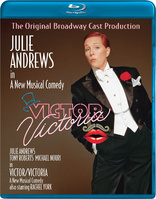Victor/Victoria: The Broadway Musical Blu-ray Movie
HomeVictor/Victoria: The Broadway Musical Blu-ray Movie 
Image Entertainment | 1995 | 146 min | Not rated | Jul 27, 2010Movie rating
6.6 | / 10 |
Blu-ray rating
| Users | 4.5 | |
| Reviewer | 3.5 | |
| Overall | 3.5 |
Overview
Victor/Victoria: The Broadway Musical (1995)
The life of an out-of-work singer changes when she meets the flamboyant Toddy. With his help, she becomes "Victor," an overnight singing sensation in the nightclubs of Paris. But success becomes hilariously complicated when she meets the love of her life, King Marchan, a macho Chicago gangster. From the electrifying excitement of Le Jazz Hot to the contemplative Crazy World, from the humor of Chicago, Illinois to the touching Almost a Love Song, this classic musical has it all.
Starring: Julie Andrews, Tony Roberts (I), Michael Nouri, Rachel York, Gregory JbaraDirector: Matthew Diamond, Blake Edwards, Goro Kobayashi
| Musical | 100% |
| Comedy | 44% |
Specifications
Video
Video codec: MPEG-4 AVC
Video resolution: 1080i
Aspect ratio: 1.85:1
Original aspect ratio: 1.85:1
Audio
English: DTS-HD Master Audio 5.1
Subtitles
None
Discs
25GB Blu-ray Disc
Single disc (1 BD)
Playback
Region A (B, C untested)
Review
Rating summary
| Movie | 3.5 | |
| Video | 3.5 | |
| Audio | 4.5 | |
| Extras | 0.0 | |
| Overall | 3.5 |
Victor/Victoria: The Broadway Musical Blu-ray Movie Review
Julie Andrews returned to Broadway in 1995 with this stage adaptation of one of her biggest film hits.
Reviewed by Jeffrey Kauffman August 27, 2010Does anyone remember the musical? Of course, we’ve had Chicago and Nine and even Repo: The Genetic Opera come down the pike recently, but for a run of more than 40 years, from the late 20s through the late 60s, the major studios pumped out musicals like there was no tomorrow, often producing some of the biggest box office hits of any given year. The interesting thing is, once talkies hit and musicals became a sterling genre, Hollywood came calling to Broadway and lured a whole slew of stage writers out to perform songwriting (and in some cases, screenplay writing) tasks for film. At the apex of the Golden Age of Hollywood, it wasn’t unusual to see songwriting teams with simultaneous smashes on Broadway and in film. Rodgers and Hammerstein, Lerner and Loewe, even relatively lesser known talents like Burton Lane (who often collaborated with Lerner), Harold Arlen and many, many others managed to segue easily between stage and screen work, though truth be told, aside from the first two partnerships listed above, they tended to be more successful in one idiom than in the other. As the 1960s wore on, it became increasingly obvious that not only was the musical waning in popularity, Broadway writers were no longer enjoying a bicoastal success story. Bock and Harnick, seen by many as the natural 1950s heirs to Rodgers and Hammerstein and Lerner and Loewe, only saw one of their stage musicals adapted for the screen, one of the last big budget musical films to actually make a lot of money, Fiddler on the Roof. (Real fans of the musical will know that Bock and Harnick’s charming musical adaptation of The Shop Around the Corner, She Loves Me, was in fact optioned for film and was planned for a while to star a certain Miss Julie Andrews). The 1960s’ leading team, Kander and Ebb, managed, pre-Chicago to get their Cabaret filmed, albeit in a radically altered version from the original stage conception. They did however also manage to eke out a few original film tunes, mostly due to their personal relationship with the star of their first stage collaboration, Flora, the Red Menace, one Liza Minnelli.
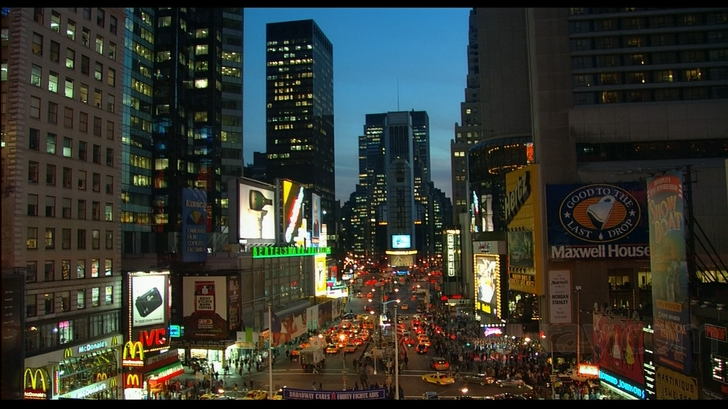
Times Square--1995. 'Victor/Victoria' at the Marquis is down left, to use stage parlance.
For some reason, the art of writing for film and writing for the stage seemed to become mutually exclusive by the end of the 1960s. The 60s’ biggest pop writing duo, Bacharach and David, succeeded in writing the much beloved Promises, Promises, an adaptation of The Apartment, though few would argue that David’s popish lyrics were in the best tradition of character revealing Broadway songcraft. The 1960s had another monster talent, though, a composer who, like Bacharach, brought a jazz energy to film scoring and piled up a bevy of chart hits through the decade. In fact, before Bacharach came along, this man was seen as the iconic film writer who perfectly melded jazz, pop and traditional film scoring into a seamless whole: Henry Mancini. And yet even Mancini with his prodigious talents never sought to crack the Broadway musical nut, preferring to stay ensconced in Hollywood and turn out score after score and, often, bestselling albums, both soundtrack and pop.
Mancini’s only real contribution to original musicals (he contributed to the That’s Entertainment series) was 1982’s raucous farce Victor/Victoria, a film where he co-wrote the film’s song score with Leslie Bricusse, a man who himself is often credited, rightly or wrongly (I feel wrongly) with helping to kill the film musical in the late 1960s and early 1970s with his original film musical versions of Doctor Dolittle, Goodbye, Mr. Chips and Scrooge. Interestingly, Victor/Victoria shared many of its themes with a Broadway musical based on a film which would take Broadway by storm the following year, Jerry Herman’s La Cage Aux Folles. Is anyone else’s head spinning yet? The irony of this all is that by the 1990s it had become de rigeur for Broadway musicals to be based on films, both musical and non-musical, rather than vice versa.
Victor/Victoria turned out to be a high water mark in the latter career of star Julie Andrews, and especially her husband, the film’s co-writer, co-producer and director, Blake Edwards. With Andrews portraying down on her luck singer Victoria, who resorts to becoming “Victor,” a world-renowned female impersonator in order to gain work in Paris, and an assortment of flamboyant queens (self-described), gangsters and gangsters’ molls as supporting cast, this was the sort of farce at which Edwards excelled, and the film brought home several Oscar nominations, walking off with the statuette for best adapted score.
When Andrews decided to return to Broadway some 35 years after her last outing (Lerner and Loewe’s Camelot, one of the biggest film flops of the late 1960s), it was decided to reshape Victor/Victoria as a stage musical. Mancini unfortunately died before he could complete the work necessary to write new material for the stage version, and Bricusse’s frequent collaborator Frank Wildhorn was brought in to complete songwriting duties. By this time, the film’s emphasis on sexual identity and the farcical elements of drag queens had become a Broadway staple in the Herman musical hit version (Mike Nichols’ hilarious non-musical adaptation of the original French film, The Birdcage, would open soon after the stage version of Victor/Victoria). There’s no denying that a lot of Victor/Victoria’s stage version seems patently derivative, whether it’s the glamorous drag queens of La Cage who help open the show, or the Chorus Line satin and sequened finale, or, indeed, the pop inflected work of Wildhorn’s shoehorned-in tunes, which represent the most hackneyed of this ilk of Broadway writing.
Andrew famously developed vocal nodules during the run of Victor/Victoria, though this new Blu-ray seems to be the same 1995 (hence early in the show’s run) video that was previously released and broadcast. One way or the other, the score is deliberately written in Andrew’s extreme lower range most of the time, to help create the illusion that she’s a man masquerading as a woman, but the sad fact here is that Dame Julie is simply not in great voice. I don’t want to allege something that’s not true, but it seems at least possible that the redoubtable star is actually lip-synching a time or two, but that may just be my suspicion. What remains is a less than brilliant score sung appealingly, if not brilliantly, by Andrews and co-star Tony Roberts (known to filmgoers for his work with Woody Allen, but who has a long Broadway and West End musical career behind him, including the London run of Promises, Promises and the Broadway musical version of Some Like it Hot, Sugar). What then is left?
The major strength of the film version of Victor/Victoria was its literally door slamming farce, with a slew of cartoonish characters, all of whom managed to be lovable even while some of them were entirely despicable. That same penchant keeps the stage version’s antics afloat, especially after a number of starcrossed love stories enter the picture, with “Victor” falling for a gangster (Michael Nouri) and Toddy (Roberts) falling for a hunky henchman (Gregory Jbara). Much like Lesley Ann Warren stole the show in the film version, the stage version’s Rachel York is hilarious as dimwitted moll Norma Cassidy.
Also working spectacularly well here is Robin Wagner’s ingenious set design, which allows the production to segue from scene to scene in a perfectly cinematic way, with few if any traditional scene changes. (Why television directors Matthew Diamond and Goro Kobayashi choose to end a couple of scenes with freeze frames is anyone’s guess, but it’s a gambit that doesn’t pay off and instantly pulls the viewer out of the “live stage performance” experience). The costume design by Willa Kim also helps to recreate a bygone Parisian era, and Billy Byers’ excellent orchestrations bring a certain sheen to a score that is never less than pleasant, but rarely rises to the heights one might expect from the vaunted name of Henry Mancini. It is interesting to note the name of Victor/Victoria’s choreographer, especially if you’re a student of where the musical film has been recently—Rob Marshall. While Marshall’s work here is certainly respectable, it shows little of the flash and spirit he’d bring years later to films like Chicago and Nine.
Andrews made headlines when she famously (a la George C. Scott and Patton, though for different reasons) refused her Tony nomination for Victor/Victoria in 1995, when she was the only member of the cast or crew to be so "honored". It really was a slap in the face to a number of gifted artists both on the stage and behind the scenes, even if it's inarguable that the show itself is certainly no classic. That rare sort of grace and class is one thing that's carried Andrews through her formidable career and more recently her health challenges. While it's sometimes ragged, that same class and grace is on display in Victor/Victoria, and the musical's comedy elements are certainly strong enough to overcome the middling aspects of its score.
Victor/Victoria: The Broadway Musical Blu-ray Movie, Video Quality 
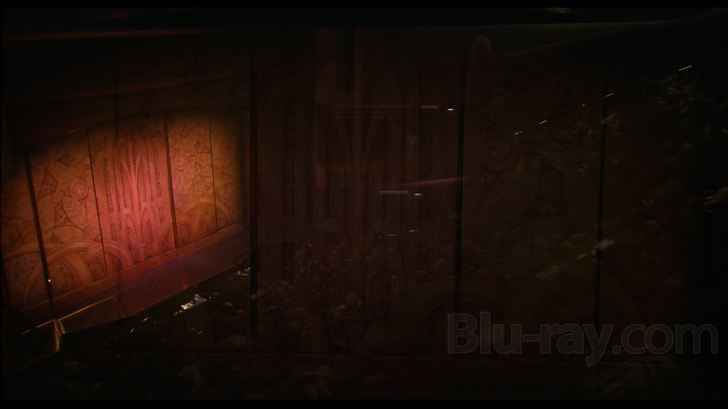
Victor/Victoria was taped for broadcast in 1995, and this Blu-ray's AVC encoded 1080i image (in 1.85:1) belies its source elements, with a somwhat problematic, transfer. While colors are generally very good and extremely well saturated, the stage lighting leads to a number of blooming issues, usually on the blue-white side of the spectrum. On the other hand, contrast and black levels are decent enough to provide a wealth of detail even in some dimly lit scenes. For instance in the opening club segment, though the lighting is not bright by any stretch of the imagination, the background ensemble member turns over cards whose faces can be clearly seen. The razzle dazzle costumes are also excellently rendered, though a couple of the gangsters' pin-striped suits present some occasional aliasing incidents. Overall, though, there's just the hint of softness to a lot of this transfer, which may bother some persnickety videophiles. This is certainly a step up from the standard broadcast version of the musical, and the SD-DVD, but the upgrade includes some issues of its own.
Victor/Victoria: The Broadway Musical Blu-ray Movie, Audio Quality 
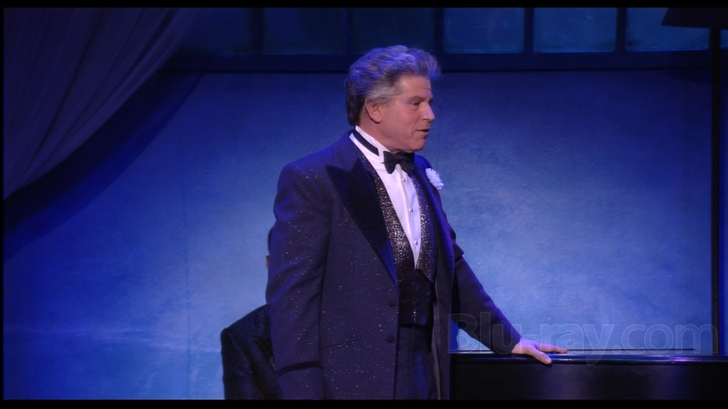
For the most part, Victor/Victoria's DTS-HD Master Audio 5.1 mix is excellently delivered, though there are unfortunately some occasional miking issues which get in the way of this release getting a higher audio score. The orchestra sounds especially robust and brilliant, especially with Byers' frequent use of colors like the accordion and glockenspiel to brighten up the aural experience. Singing, while never operatically hyperbolic, is good to excellent, though balance issues occasionally spring up, burying some syllables here and there. There's no real directionality to speak of (The Marquis has a fairly narrow stage, which may play into this), but the surrounds do offer the orchestra and hall ambience with a fair degree of live performance accuracy. Fidelity is excellent throughout and dynamic range, though limited by the piece's aims and ambitions, is very good.
Victor/Victoria: The Broadway Musical Blu-ray Movie, Special Features and Extras 
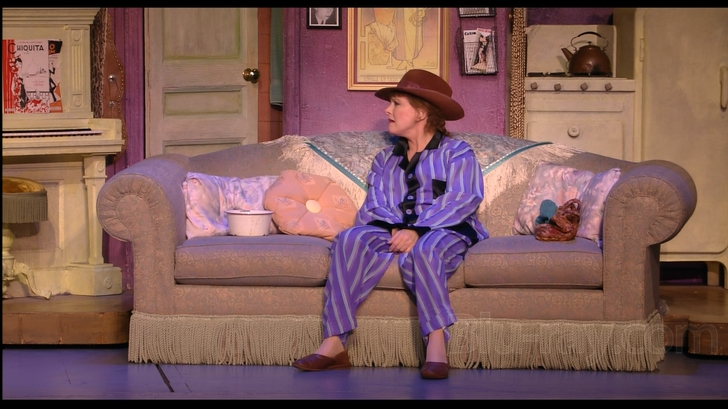
No supplements are included on the disc.
Victor/Victoria: The Broadway Musical Blu-ray Movie, Overall Score and Recommendation 
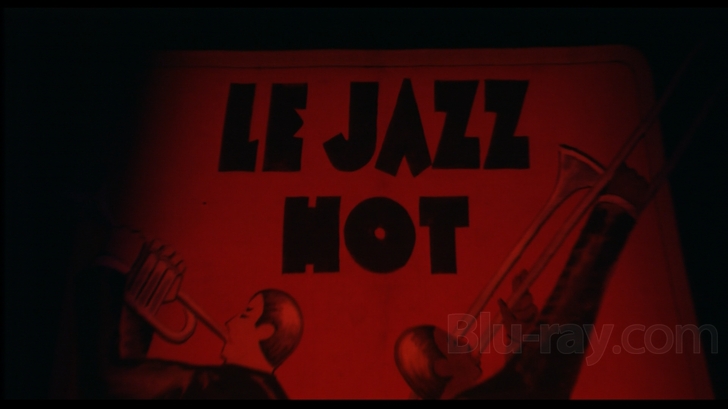
Audiences didn't exactly flock to see Julie Andrews come back to Broadway, though her Tony Award brouhaha managed to up the boxoffice and help the show run for almost two years. Victor/Victoria is the sort of show which, back in the day, would be sold to theater parties and marketed as a "businessman's musical," a no-brainer entertainment with a largely lackluster score but with some big laughs in its over the top book. The best things here, aside from being able to see Andrews perform live, are the engaging scenic design by Wagner and Edwards' sly and often surprisingly wise and witty book. This may be the very definition of a niche product, but for that niche, Victor/Victoria is recommended.
Similar titles
Similar titles you might also like

Victor/Victoria
1982

Du Barry Was a Lady
Warner Archive Collection
1943

Anchors Aweigh
1945

The Harvey Girls
Warner Archive Collection
1946

A Funny Thing Happened on the Way to the Forum
1966

Mamma Mia! Here We Go Again
Sing-Along Edition
2018

Reefer Madness: The Movie Musical
2005

Les Girls
Warner Archive Collection
1957

Hair
1979

Calamity Jane
1953

Show Boat
1936

A Night at the Opera
Warner Archive Collection
1935

Gypsy
Warner Archive Collection
1962

Rock of Ages
Theatrical & Extended Cut
2012

Clambake
1967

Robin and the 7 Hoods
1964

Mame
1974

Road to Bali
1952

The Producers
2005

History of the World: Part I
1981
